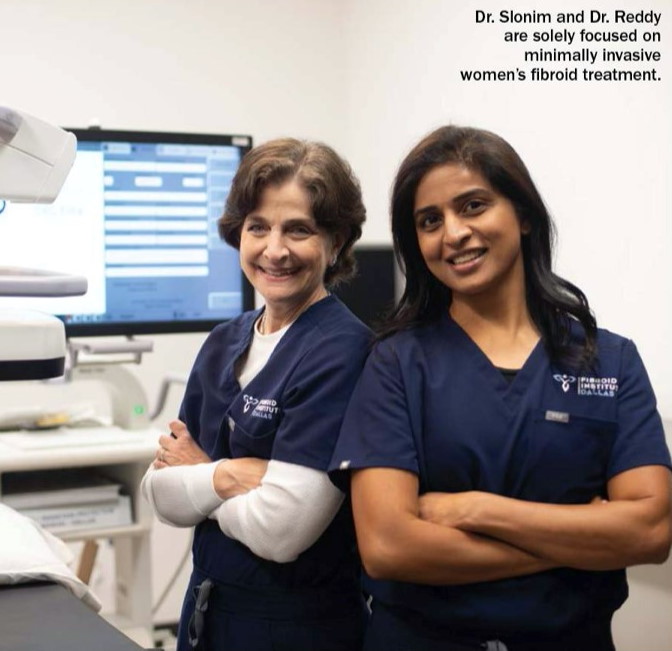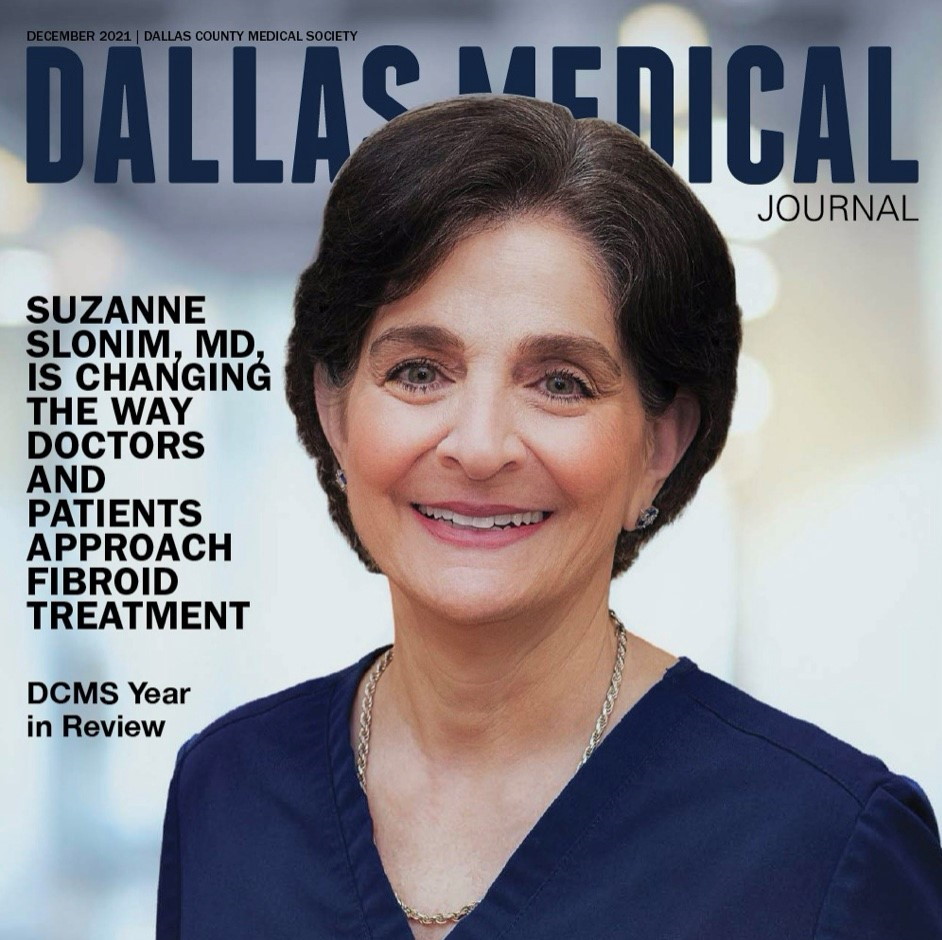Read about Suzanne Slonim, MD, in Dallas Medical Journal
WHAT: Dallas Medical Journal and the @dallascountymedicalsociety featured Dr. Suzanne Slonim, founder and medical director for Fibroid Institute Dallas in its December issue. Fibroid Institute Dallas is passionate about helping all women who suffer with fibroids avoid surgery if possible and receive minimally invasive treatment options to live fibroid free. Thank you, Dallas Medical Journal, for bringing additional awareness to the importance of fibroid treatment options for women.
WHEN: 12/3/2021
WHERE: Dallas, Texas
LINK: http://www.dcms.branchmediapro.com/2021/12Dec/ or view PDF below
Dallas-Medical-Journal-Dr-Suzanne-Slonim-cover-story-2021.12Alternative Treatment Helps Women Avoid Hysterectomies
July named Uterine Fibroid Awareness Month in Texas
By Rebecca Walters
Call it a quest, goal or life’s mission. However you label it, Suzanne Slonim, MD, FSIR, FACR, has dedicated her professional—and often personal—life to helping women who suffer from uterine fibroids.
As the founder and head physician at the Fibroid Institute Dallas, Dr. Slonim is an expert in treating uterine fibroids employing a non-surgical technique called Uterine Fibroid Embolization (UFE), which eliminates and alleviates the symptoms caused by uterine fibroids—and allows women to keep their uterus. She also devotes considerable time outside of work raising awareness, educating and advocating for women’s health issues.
Dr. Slonim, 58, is an interventional radiologist and has treated more than 30,000 patients and trained numerous doctors in mastering the UFE technique. In addition to authoring peer-reviewed publications and presenting at national medical association meetings, she’s a fellow of the Society of Interventional Radiology and of the American College of Radiology.
Uterine fibroids are a common type of tumor, ranging from pea-sized to larger than a grapefruit. About 70 to 80 percent of women will develop fibroids during their lifetime. Most of the time, women are unaware they have them because they never develop symptoms that require treatment. But for those who do, uterine fibroids can be life-disrupting and debilitating, Dr. Slonim says.
Uterine fibroids become more problematic the larger they get. Left unchecked, symptoms include pelvic pain, bloating, pain during sex, heavy periods, bleeding between periods and infertility. Her philosophy when it comes to treating patients is “no one knows your situation better than you,” she says. “Listen to your body.”
Unfortunately, “most women don’t come in until they’ve suffered for years and finally say ‘enough is enough,’” Dr. Slonim says. In severe cases, women can become anemic, which can lead to more serious health problems. “Normal hemoglobin levels are 11 to 12. I’ve had patients come to me that are at a 4 to 5.”
Uterine fibroids are most prevalent in women of color. “Black women in particular are much more likely to have them,” Dr. Slonim says. “Uterine fibroids are a public health crisis, especially for Black women. They get them younger, the fibroids grow faster, larger, and more numerous, and Black women experience more complications during surgery,” she says. “It’s an epidemic.”
While a handful of treatments exist, uterine fibroids “historically have been treated by performing hysterectomies,” says Dr. Slonim. But in many cases, hysterectomies can and should be avoided, especially for women who want to have children and for those who, for various reasons, want keep their uterus, she says.
“UFEs allow women to avoid surgery and keep their uterus,” Dr. Slonim says. “It’s interesting to learn how many women have a personal or spiritual connection to their uterus. They don’t want to lose it. I feel strongly that a woman shouldn’t have to have a hysterectomy if she doesn’t want one. There are options; there should be no unwanted hysterectomies.”
Dr. Slonim exclusively performs UFEs, but says other treatments are viable options. Non-invasive solutions include birth control pills and IUDs that deliver hormones and help regulate periods, as well as medications that cause menopause. However, none of them are great for the long-term, she says. In addition to hysterectomies, other more-aggressive treatments include endometrial ablations and myomectomies.
The UFE procedure involves making a tiny puncture and inserting a thin catheter at the groin or wrist. Small particles are released through the catheter that block the small blood vessels leading to the fibroids, which causes them to die and shrink.
“There’s minimal downtime, and it takes about a week to recover,” she says. A well-developed, pain-management protocol is a must, she adds, because women will experience pain as the fibroids are dying.
“I enjoy doing the UFE procedure, and I’m good at it,” she says. “I feel it’s a very important to provide this alternative service. It’s very rewarding that I can offer something safe and effective to women seeking treatment.”
Dr. Slonim performed her first UFE in the late 1990s. Originally from Miami, Florida, Dr. Slonim graduated from Duke University and attended medical school at George Washington University. She interned at UCLA San Fernando Valley Program and completed her residency at Lahey Clinic Medical Center in Burlington, Mass., as well as a fellowship at Stanford University Medical Center. Before opening the Fibroid Institute she was associated with Methodist Health System, including Charlton Medical Center and Dallas Medical Center.
For years, she performed maybe 10 UFEs a year, but the procedure is becoming more widely recognized and accepted. These days, Dr. Slonim says she averages about 10-15 UFEs per week, adding there are a handful of practices across the United States that exclusively perform UFEs. Most of her patients are between the ages of 35 and 55, but she says can treat any women at any stage of life.
UFE as a treatment for uterine fibroids was discovered sort of by “happenstance,” Dr. Slonim says, after doctors observed the method used to stop peri-partum bleeding. “We noticed that fibroids also shrank (during this procedure), and so we tried it on women who weren’t pregnant,” she says.
When the Institute was newly opened, most patients found Dr. Slonim via the internet and through educational marketing efforts. These days, most patients are referrals from area OB/Gyns.
“We had about 150 doctor referrals in 2020,” she says. “We have a very collegial relationship, and that’s always best for our patients. In Dallas there’s no turf war going on.” With her patient list growing, Dr. Slonim in September brought in a partner, Uma Reddy, MD, to help treat and educate even more women.

“This is my baby, I’m very proud,” she says. Indeed, Dr. Slonim is passionate about what she does and about getting the word out.
So much so, that her efforts were instrumental in getting legislation passed at the city, county and state levels, including the recent passing of two Texas House Bills. H.B. 1966 designates July as Uterine Fibroid Awareness Month, while H.B. 1967 creates an information and research database of women with uterine fibroids.
Dr. Slonim says her involvement centered on connecting with state and local government decision-makers and influencers. She also held virtual and limited in-person events and webinars (because of the Covid-19 pandemic) as well as took to social media.
“It’s all about getting the conversation going. The governor signed it, and the city and county followed suit,” she says. “It’s brand new. It just passed in September, so I’m looking forward to what next July brings,” she says. “Our hope is that it there will be more support and events to raise awareness.”
“I want to get women talking,” Dr. Slonim continues. Her plan is to talk about it online, visit predominantly black churches and health centers and restaurants with a diverse customer base. She also wants to have conversations with Black friends and gynecologists and to reach out to Black sororities to educate younger women.
“If Black women don’t know that this exists, then they don’t know there is something they can do about it,” she says. “It’s hard to have this conversation without mentioning the health disparities that exist in this country, when healthcare isn’t even readily available or the quality is lacking to a segment of the population; it’s multifactorial.”
Dr. Slonim and her staff are very involved in the Dallas community, volunteering for organizations including Urban Specialists and Buckner International, among others. “If I have the opportunity I like to mentor women medical students, and I volunteer with women-focused programs.
With whatever time Dr. Slonim has left—outside of her practice and giving back to the community—she enjoys listening to audiobooks, tending to backyard chickens and traveling.
“I guess you could say one of my hobbies is helping women,” she says.

